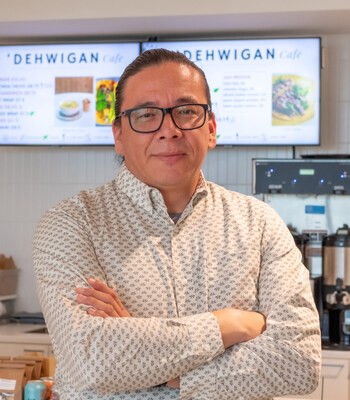
Chef Joseph Shawana becomes the first Indigenous Culinary and Foodways Guide at Centennial College, a new role established by the College as part of its commitment to reconciliation.
In the new role, Shawana will have a focus on ensuring the College remains at the forefront of culturally grounded approaches to Indigenous food and food sovereignty. It's work that will contribute to advancing an Indigenous Strategic Framework developed by the College in response to the Truth and Reconciliation Commission's Calls to Action.
The College's commitments are organized under five pillars within the Framework that include Indigenous learning and development for all. One of those commitments is to increase the number of Indigenous employees with hires across faculty, learner-facing and management positions, and provide appropriate onboarding and culturally relevant supports to ease adjustment and transition. As an administrative position, the Indigenous Culinary and Foodways Guide role is empowered to make change across the College.
Shawana is an Odawa from the Three Fires Confederacy who was born and raised on Wiikwemkoong Unceded Territory on Manitoulin Island. As an accomplished chef, he is known for blending his Indigenous heritage and classical French culinary training.
The newly created role is the second cultural guide position to be established at Centennial, alongside Indigenous Cultural Guide Maureen Hearns. As a link between the College, the School of Hospitality, Tourism and Culinary Arts, and the communities they serve, Shawana will report jointly to the School's Dean, Damian Goulbourne, and Seán Kinsella, Director, the Eighth Fire.
Kinsella, whose title is a nod to the Anishinaabe Seven Fires prophecy, is a guide in their own right, as a steward of community efforts to decolonize and Indigenize the College.
"In establishing the Indigenous Culinary and Foodways Guide role, the College continues to recognize the ongoing work and sustained commitment it will take if we are to realize our shared aspirations for reconciliation," said Kinsella. "Joseph is a natural teacher, and we are fortunate to have him carving the path forward in this new role facilitating dialogues, connecting with Indigenous communities and conducting culinary foodways training."
Shawana has been a part of the Centennial College community since 2019, bringing Indigenous cultural events and traditional ceremonies onto campus in the form of Full Moon Feasts. The Feasts, which combine Indigenous cuisine and teachings on the significance of new moons, are a collaborative effort of colleagues across the culinary school and The Centre for Faculty Development and Teaching Innovation including Chef Rodney Bowers, Shannon Winterstein and Harmony Nadjiwon. Shawana has also developed food courses, and has taught courses such as Catering Culinary Operations, Cook's Desserts, Local and Sustainable Cuisine, and Restaurant Culinary Operations.
Damian Goulbourne, Dean, School of Hospitality, Tourism and Culinary Arts, said the Indigenous Culinary and Foodways Guide role marks a significant step in creating an inclusive culinary education.
"By integrating the deep traditions of Indigenous culinary heritage into our curriculum, we are fostering a community where respect, understanding, and cultural exchange thrive," said Goulbourne. "Chef Joseph's Odawa heritage and his world-class culinary expertise make him the perfect guide to advance this initiative."
For Shawana's part, he can't wait to get started bringing his plans and vision for the role to life.
"I am eager to dig in to the Indigenous Culinary and Foodways Guide role, to build on important work that is happening at Centennial College and expand opportunities to engage with Indigenous practices and teachings across our campuses and community," said Shawana. "One example of what this might look like is hosting community seed exchanges, which is how we can sustain plants like the Lakota squash once thought to be lost, but which now grows in our garden beds.
"Indigenous Peoples learn about the traditional value of plants and animals through oral storytelling. We only take the learnings we need and pass these interpretations along to children and youth. It's similar to how I teach my students recipes. It's not about replicating the dish; it's about bringing your own interpretation to the plate. I'm excited about bringing Indigenous ways of knowing and doing to an audience that extends beyond the classroom as Indigenous Culinary and Foodways Guide."
It's work that began in earnest this past summer as Shawana stepped into the role.










